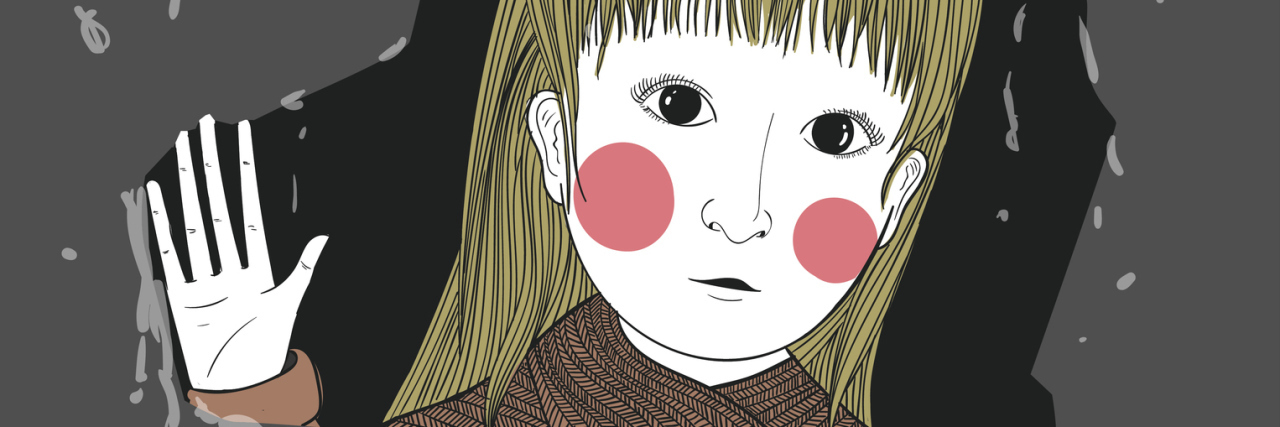There have been countless times when I could clearly identify (and even articulate) whether I was experiencing a symptom of anxiety or depression. Most mental health problems have overlapping symptoms, but usually there are some defining characteristics that set one apart from another. However, after about two decades of having both anxiety and depression, the line has blurred. And the reality of just how blurry it had become happened when my psychiatrist asked me — now that I’m on new medication — which one I was experiencing more strongly, anxiety or depression?
I just stared at him, and finally whispered, “You know, I don’t think I can tell the difference anymore.” I was almost in tears, because that realization was both confusing and terrifying. How can I not tell the difference? Aren’t they totally different? Aren’t they… opposite? Apparently not, because his response was, “That’s OK, they tend to overlap a lot of times. “I was baffled, but he wasn’t. I didn’t bother asking how that was possible, but in the coming months I began to understand what he meant.
Here are some areas where I see the overlap:
1. Fatigue.
Depression is a clear winner when it comes to causes of fatigue. But anxiety runs a close second. Depression certainly can make feel tired, too tired to move. But anxiety has a way of actually wearing you out to the point where you have nothing left (which doesn’t stop you from being anxious unfortunately). I’m always tired, always. And yet I couldn’t articulate why if I tried.
2. Insomnia.
On the flip side, I have an awful time trying to get to sleep. I’ve always blamed that part on anxiety. My never-turns-off brain just doesn’t want to let me sleep. But depression is also well known for causing insomnia. The reason may be less clear cut, but it’s equally as prevalent. One of the most frequent complaints of people diagnosed with depression is insomnia, or early waking. It turns out my racing mind might not be the only cause of my sleep problems after all.
3. Lack of enjoyment.
My first instinct is to say, “Of course depression makes it impossible to enjoy anything” — because you’re depressed. And yes, depression does tend to rob people of any sense of enjoyment, even in things they once took pleasure in. But how many parties have I avoided going to because of my anxiety? How many places have I avoided driving? How many phone calls have I avoided making? I couldn’t count them all even if I wanted to, and I don’t want to. I don’t enjoy a loud crowded concert if all I’m doing is worrying about all the things that could go wrong, and all the things I can’t control.
4. Trouble concentrating.
I usually blame it on ADHD, but even when taking medication for it, I still struggle —usually when my depression or anxiety is acting up. When I’m depressed, I find it difficult to get motivated and stay motivated. When I’m anxious, I find it difficult to focus on any one thing before I start worrying about another and another. It can be a combination of all three at times, and those are good days to plan on accomplishing as little as possible.
5. Appetite changes.
Oh depression, some days you make me want to eat an entire buffet to fill the void in my soul. Other days, I would be happy to never see food again. But anxiety is no less cruel. Sometimes my stomach is so in knots with dread and fear I can barely consume enough water to stay hydrated. Some days though, I am so amped up that no amount of food seems like enough. I’m like a shark on a feeding frenzy, trying anything to slow down the swirling vortex of anxiety which is consuming me.
6. Sex.
Yes, I said it. I know, we don’t like to talk about sex, because for some strange reason, it is still taboo. But mental heath (and mental health medications) and sex are inextricably linked. Depression can obviously cause a loss of interest in all things, and often sex drive is the first to take a hit. It can also make you pursue sex more frequently in an attempt to “feel better” if even for a brief period of time. Likewise, anxiety can rob you of the desire whether it’s through excessive worry about sex itself, or simply draining you of the mental and physical energy to do it. It can also cause you to crave compulsive or excessive sex in an effort to burn off (or ignore) all of the thoughts and worries consuming you. Both are equal offenders, regardless of gender.
There are an endless number of things that can be caused by both depression and anxiety. Trying to separate the two is not like separating water and oil. It’s more like water and carbonation. Good luck getting those fizzy bubbles back out of there. Once you combine depression and anxiety, I believe you are essentially creating one big illness with two labels. But don’t let the two labels fool you — trying to distinguish what is anxiety and what is depression can simply be an impossible task.
If you or someone you know needs help, visit our suicide prevention resources page.
If you need support right now, call the National Suicide Prevention Lifeline at 1-800-273-8255 or text “START” to 741-741.
We want to hear your story. Become a Mighty contributor here.
Thinkstock photo via piyapong sayduang.

